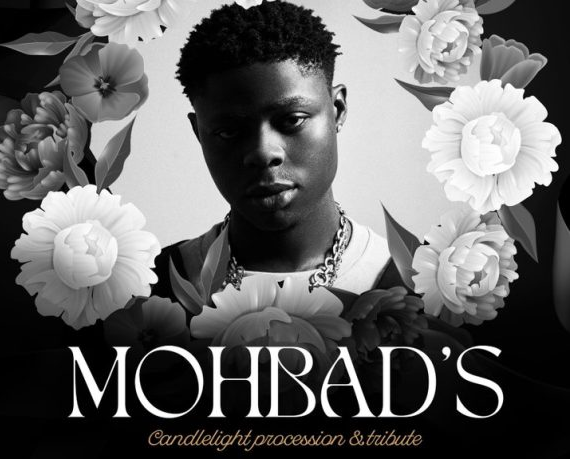By Abdullahi Haruna Haruspice
First, there was Dagrin, the legendary hip-hop crooner whose brilliance was extinguished prematurely by the cruel hands of fate. He was barely 25 years old when he reigned lyrically supreme. His songs, woven with deep philosophical messages, dominated the airwaves as he reveled in the glitz and glamour of fame. Then, one fateful morning, the nation awoke to the shocking news of Dagrin’s demise in a ghastly car accident. With that tragic event, the meteoric rise and fall of a star destined for the world stage came to an abrupt end.
Until his untimely departure, Dagrin, whose real name was Oladapo Olaitan Olaonipekun, was a gifted Nigerian rapper and songwriter who left an indelible mark on the Nigerian music scene. His unique style of Yoruba rap, combined with thought-provoking lyrics, garnered him rapid recognition in the mid-2000s. Hits like “Pon Pon Pon,” “Kondo,” and “Ghetto Dreams” showcased his talent. Dagrin’s passing at just 25 years old sent shockwaves through the nation, leaving fans and fellow artists mourning his loss and celebrating his contributions to Nigerian hip-hop.
While we were still reeling from the untimely end of Dagrin, another devastating blow struck on September 14, 2011. This time, it was the news of Mc Loph, Obiajulu Kenneth Nwaozor, a highlife rapper renowned for his hit remix of Osadebede’s song. He perished in a tragic car crash on the Benin–Ore Expressway. His light was extinguished just as he was gaining richly deserved recognition, and the news was even more heartbreaking as he was reportedly on his way to his ancestral home in Anambra State to perform traditional rites with his fiancée and sister. Mc Loph never reached his destination or reached the pinnacle of his career; his light dimmed too soon.
Following in this catalogue of prematurely dimmed lights was Keffee, the gospel song diva who breathed her last on June 13, 2014, after spending many weeks in a coma in an American hospital. She fell into a coma after collapsing during a 14-hour flight to Chicago for an event. Like those before her, she was an unripe apple, plucked by the merciless hand of death—taken from us before her star could fully shine. Caught in a similarly unfortunate twist of life’s cruelty was the death of hip-hop crooner Goldie. Just hours after her return from Los Angeles, where she had attended the 2013 Grammys, tragedy struck. Although she had complained of headaches, her condition wasn’t taken seriously. Sadly, she too passed away, becoming another young Nigerian musical icon whose life was tragically cut short during the prime of her career.
Nigerian singer Olanrewaju Fasasi, better known as Sound Sultan, joined the list of young Nigerian stars dimmed by the shadow of death when he passed away on July 11, 2021, after a brave battle with throat cancer in the United States. The “Jagbajanti” crooner left us at the age of 44. He was widely loved and seen as a huge inspiration to many young people in Nigeria. His untimely death shattered countless hearts as they mourned the premature loss of a kind-hearted individual who had made a purposeful impact.
Death, the grim reaper, wasn’t done with its relentless onslaught. This time, it struck with the choking of the baby bird Mohbad, whose first flight was abruptly cut short. He was young, promising, and pulsating with rhythmic energy. His songs, filled with heavy emotive lines, electrified partygoers on the dance floor and made him the delight of all music lovers. While he remained relatively unknown in Nigeria, his tragic death became a national topic of discussion, and the circumstances surrounding his demise were so perplexing that the government ordered an autopsy on his remains. Long nights of processions were held in his honor across some states in Nigeria, with rights activists and celebrities demanding an inquiry into his death.
As we mourn this additional loss of a budding songbird, it is time to move from the bedroom of emotions to the sitting room of logic and begin to question the circumstances surrounding the painful early exits of our young musical sensations. Why are we losing these icons at an alarming rate, like a wildfire in Harmattan season? From the deaths detailed here, some can be traced to ghastly car accidents, while others resulted from sudden deaths due to seizures. Are our young talents under certain influences or pressures? While we may not be callous enough to attribute these deaths solely to substance abuse, it is a phenomenon worth examining. The expectation that comes with being a musical star sometimes carries an unwritten code that suggests the need for drugs to reach the desired level of success. This is why we find many in the entertainment industry having some links with hard drugs, alcohol, and other prohibited substances.
Another creeping reality dimming the lives of our youngsters is the unreported affinity with cult-related fraternities. There is an unproven notion that success in the entertainment industry requires a deep connection with occultic groups, and many are seen battling to belong in order to achieve A-list stardom.
Society must take action and address these menacing issues. Parents must be actively involved in their children’s lives. We live in a time where parenting has transitioned to the virtual reality, where the internet plays the role of both father and mother. It’s time we stand up for our young talents, or we’ll continue to sit in mournful grief at their untimely departures.
Mournfully musing.

 Join Daily Trust WhatsApp Community For Quick Access To News and Happenings Around You.
Join Daily Trust WhatsApp Community For Quick Access To News and Happenings Around You.


